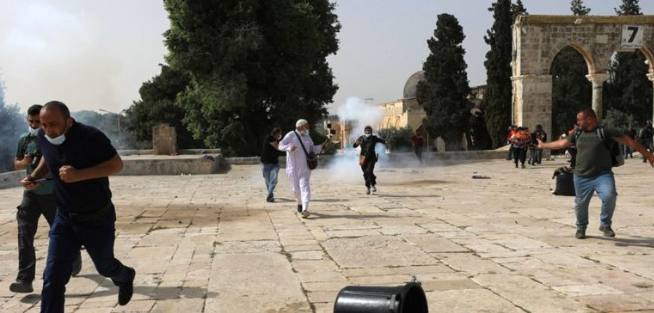Jerusalem crisis: Pleas for calm as violence escalates
Countries worldwide have appealed for calm after days of unrest spiralled into retaliatory attacks by Israel and Palestinians.

Countries worldwide have appealed for calm after days of unrest spiralled into retaliatory attacks by Israel and Palestinians.
The US, the European Union and the UK have urged Israel and the Palestinians to lower tensions as soon as possible.
The violence escalated on Monday night after Palestinian militants fired rockets toward Jerusalem.
In response, the Israeli military launched air strikes against militant targets in the Gaza Strip.
Palestinian health officials in Gaza said 20 people, including children, had died in the strikes. Israel’s military said at least three members of the Hamas group that rules Gaza were among those killed.
Hamas had threatened to strike after hundreds of Palestinians were injured in clashes with Israeli police at a holy site in Jerusalem on Monday.
Israel’s Prime Minister Benjamin Netanyahu said Hamas had “crossed a red line” and that Israel would respond “with great force”.
The past few days have seen the worst violence in Jerusalem for years.
Increasingly violent confrontations between Israeli police and Palestinian protesters at a compound in Jerusalem’s Old City have threatened to trigger a wider conflict.
Palestinians have been angered about restrictions on access to the compound, where the al-Aqsa mosque – the third holiest site in Islam – is housed, along with the Temple Mount – the holiest site in Judaism.
More than 300 Palestinians were wounded in confrontations with Israeli police at the al-Aqsa mosque on Monday.
The fundamental reason for the renewed violence does not change. It is the open wound of the unresolved conflict between Jews and Arabs that has blighted and ended Palestinian and Israeli lives for generations.
This latest episode has happened because of tension in Jerusalem, the sharpest part of the conflict. The holy sites in the Old City are national as well as religious symbols. Crises affecting them have often ignited violence.
The triggers for what has happened this time include heavy-handed Israeli policing of Palestinians during Ramadan and controversial efforts in the Israeli courts to evict Palestinians from their homes.
But other events could have had the same effect. This was a crisis waiting to happen, in a conflict that, once again, has been left to fester.
Leaders on both sides have concentrated on safeguarding their own positions.
The biggest challenge, of making peace, has not been addressed seriously for years
What’s the global reaction?
US Secretary of State Antony Blinken said Hamas must end the rocket attacks “immediately”, adding: “All sides need to de-escalate.”
White House spokeswoman Jen Psaki echoed those calls, saying US President Joe Biden was seriously concerned about the violence.
In a tweet, UK Foreign Secretary Dominic Raab said the rocket attacks “must stop”, calling for “an end to targeting of civilian populations”.
The EU’s foreign policy chief, Josep Borrell, said the “significant upsurge in violence” in the West Bank, Gaza and East Jerusalem “needs to stop immediately”.
Why is Jerusalem a flashpoint?
The city, with its sacred sites, is the most sensitive place of all in the decades-old conflict between Israel and the Palestinians.
Alongside its religious importance are national claims – Israel in effect annexed East Jerusalem and considers the entire city its capital, though this is not recognised by most other countries.
Palestinians claim the eastern half as the capital of a hoped-for state of their own

The hilltop compound containing the al-Aqsa mosque and buttressed by the Jewish holy site of the Western Wall is especially sensitive, with both Israel and Palestinians wary of each other’s intentions and activities there.
Israel says the current violence there was planned “well in advance” by Palestinian extremists, though a series of events has driven unrest in Jerusalem.
On Monday, a planned march by Israeli nationalists which was due to pass through Muslim areas of East Jerusalem’s Old City was called off over fears it could stoke unrest.
The Jerusalem Day event marks Israel’s capture of East Jerusalem in 1967.
It is regarded by many Palestinians as a deliberate provocation. This year’s march would also have taken place in the final days of the Islamic holy month of Ramadan
Source: BBC


